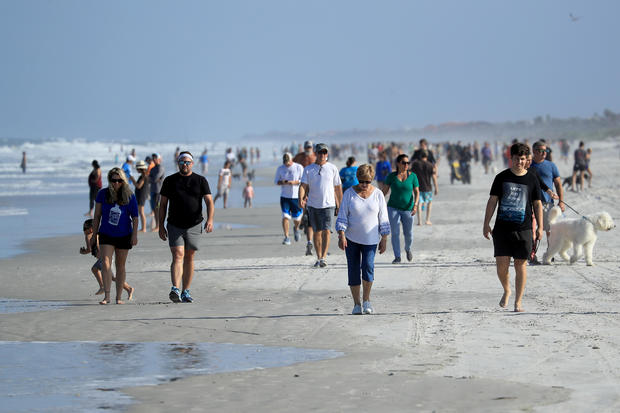Crowds flock to reopened Jacksonville beaches as Florida hits record coronavirus cases
Mayor Lenny Curry reopened beaches and parks in Jacksonville, Florida on Friday, after Governor Ron DeSantis gave the green light for them to reopen, despite the state hitting a record number of coronavirus cases. When they opened at 5 p.m., crowds flooded the area, ignoring social distancing warnings.
Jacksonville Beach, Neptune Beach and Atlantic Beach are now open from 6-11 a.m. and 5-8 p.m. for "essential activities." They are closed during all other times.
More than 25,000 people in Florida have been infected with COVID-19, and schools, business and public events are all closed or canceled to try to slow its spread, according to the state Department of Health.
Curry said recreational activities consistent with social distancing guidelines such as walking, biking, hiking, fishing, running, swimming, taking care of pets and surfing are considered essential and do not contradict DeSantis' executive order. Activities such as sunbathing, grilling, and congregating in large groups are prohibited.
"This can be the beginning of the pathway back to normal life," said Curry. "Please respect and follow these limitations. Stay within the guidelines for your safety as well as for the safety of your neighbors."
But photos of the Jacksonville beaches show hundreds of people walking, swimming and talking in large groups — many without face masks. Twitter users on Saturday morning called out Floridians for not taking proper precautions, as "Florida morons" trended nationwide.
When the virus first hit the U.S., DeSantis was criticized for not shutting down the state. Thousands of people — including reckless spring breakers — packed the state beaches at the time, leading to closures.
"What we're trying to do is maintain a scenario where we're not crowding the beach. We still have to be cognizant of the six-foot distance between people," Jacksonville Beach Mayor Charlie Latham told reporters Friday. "And we're looking to keep people from just accumulating out here. First, we inform people what the rules are. Then we warn if they don't comply. And then we take additional action, if necessary, if they still don't comply."




